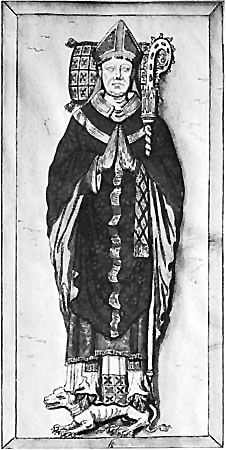
Pierre Cauchon
Joan's Judge & Primary Antagonist
 "Bishop, I die through You!"
"Bishop, I die through You!"
Joan of Arc speaking to Pierre Cauchon in Rouen
Pierre Cauchon was born about 1371, in the environs of Reims, studied at the University of Paris. Licentiate in law in 1398, he was among the Parisian students who took part in the vote on withdrawing from obedience to Pope Benedict XIII; in 1403 he was a student in the sixth year in theology. When rector of the University, he sought to obtain a benefice near the Chapter of Reims, although he had already accumulated a canonicate and prebendary in the church of Chalons, and was curé of the parish church of Égriselles in the diocese of Sens. In 1406 he carried the matter of refusing obedience to Benedict XIII before the Parlement of Paris. The following year he was a member of the large embassy to Italy to summon Benedict XIII to renounce the Papacy. In 1408 as a recompense for his services in this matter he obtained the major chaplaincy of Saint Etienne of Toulouse. He was canon of Reims in 1409; bishop's deputy at Reims in 1410, and canon of Beauvais, June 28, 1410 (Register of the cathedral chapter). In 1412 he was among the reformers charged with severity against the excesses of the Armagnacs; in 1413 at Paris he led the rising of the Cabochiens. Banished from the capital in 1414, this
revolutionary prelate went, as ambassador of the Duke of Burgundy, to the Council of Constance (1415), where he intervened in favor of Jean Petit, the Burgundian tyrannicide. In 1418, as King's master of petitions, he pleaded to obtain the provostship of Lille, vacant upon the death of Jean de Montreuil. On this occasion the University entreated the Pope to accord him the favor of uniting various incompatible benefices, citing his courage and his works for the good of the Church. He was next archdeacon of Reims, canon of Reims, Chartres, Châlons and Beauvais, chaplain of
the chapel of the Dukes of Burgundy at Dijon, holder of the benefice of St. Clair in the diocese of Bayeux, all of which brought him about 2,000 livres a year. He obtained in addition the archdeaconate of Chalons. In 1419 Pierre Cauchon was réferendaire of Pope Martin V, whom he helped elect, then conservator of the privileges of the University of Paris.
Elected on August 21, 1420, on the recommendation of the University of Paris, and ecclesiastical. peer of the kingdom by favor of Philippe le Bon-who came himself to attend his taking of office -- Pierre Cauchon served the English party from that time and followed Henry V to Paris, where he fought the Chapter and Bishop Courtecuisse. In Bedford's confidence, an executor of the will of Charles VI, and councilor of Henry VI with a salary of 1,000 livres, Cauchon was guardian of the privy seal in the absence of the chancellor. He was in charge of important missions.
At Rouen, after 1426, Pierre Cauchon put in accord the Chapter and the Bishop on the subject of the Cardinalate. Expelled from Beauvais with the English (August, 1429), Cauchon fled to Rouen where he had already visited many times: the English indemnified him for the loss of his revenues and put him in charge of special missions in England, Paris, etc. was one of them. Pierre Cauchon did not, however, obtain the archbishopric of Rouen, which he had administered in matters spiritual and temporal, but he became Bishop of Lisieux in 1432. He lived for the most part at Rouen, near the Grand Council, of which he was a member.
As the Queen of England's chancellor in France, Cauchon went to the Council of Bâle as a deputy of England in 1435, and was present at the Council of Arras where he sustained until the end the exclusive right of Henry VI to the crown of France. He was nearly captured at Paris, in the Bastille Saint Antoine, in 1436, when the French reëntered the capital.
In that year Pierre Cauchon received the commission to-call together at Caen the Three Estates and informed them of the King of England's intention to found a university at Caen (Bibl. Nat. ms. fr. 26,061). He fulfilled numerous diplomatic missions relative to the English peace (the conferences of Calais and Gravelines). On July 29, 1437, he gave a receipt to the Treasurer-general of Normandy for 770 livres, the balance of a sum of 2,177 livres for a trip from Paris to Rouen in the King of England's service (Bibl. Nat. ms. fr. 26,063). In 1439 and 1440
Pierre Cauchon was commissioned with several trips to Calais and to England to treat for peace between the two kingdoms, and concerning the deliverance of the duc d'Orléans.
Pierre Cauchon died suddenly, while he was being shaved, at his fine hotel Saint-Cande, on December 18, 1442, at the height of his honors. He left as heirs his nephew, Jean Bidault, canon of Reims and Lisieux, and Jeanne Bidault, wife of Jean de Rinel, secretary of Henry VI, whose name appears at the end of the Treaty of Troyes. Cauchon's body was carried in state to Lisieux, accompanied by his friend and executor, Nicolas Caval, canon of Rouen. He was interred near the altar in the magnificent chapel of the Virgin which he had rebuilt and decorated at his own expense. It is remarkable to note that the admirable, Frenchman who succeeded him as Bishop of Beauvais, Jean Jouvenel des Ursins, a propos of the fidelity of the people of Beauvais to Charles VII, made but a brief allusion to his predecessor, and did not mention Jeanne's trial in this connection: "And although they held your adversary for Lord, that was because the Lord Bishop was in this foolish error; but always they were your servants at heart. . ."
(Biography from The Trial of Joan of Arc by W.P. Barrett)
|